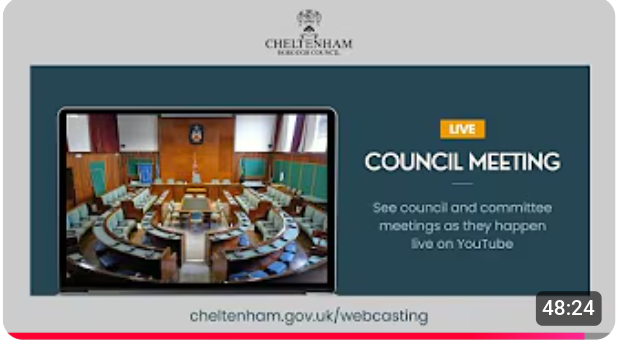Cheltenham’s Housing Debate: A Trickle-Down Fantasy and a Council At A Loss

A humorous AI take on Council Meeting in the style of parliamentary sketch writer
Picture the scene in Cheltenham’s council chamber: a room humming with the earnest buzz of local democracy, where councillors gather to wrestle with the great issues of the day—chief among them, the private rental sector’s slow-motion car crash. Enter Councillor Foster, (Green Party, Prestbury) the evening’s hero, waving the flag for tenants crushed by rents gobbling up 40% of their income and haunted by the spectre of no-fault evictions. She’s armed with info about Airbnbs inflating rents faster than a property developer’s balance sheet. It’s a rare moment of clarity in a council meeting that otherwise feels like a masterclass in dodging responsibility.
Step forward Councillor Allen, (Lib Dem, Swindon Village) Cheltenham’s very own Liberal Democrat prophet of the free market, clutching his dog-eared copy of Economics for Dummies. With the zeal of a Thatcherite revivalist, he declares that ‘the law of supply and demand’ will save us all. Give developers free reign to build executive homes over Cheltenham’s green spaces and affordable housing will magically trickle down to the plebs.
Trickle-down housing! It’s the kind of fantasy that makes you wonder if Allen’s been sipping from the same chalice as Ronald Reagan. Newsflash, Councillor: piling up luxury flats for cyber-tech bros doesn’t magically conjure up homes for the barista who can’t afford her one-bedroom flat. The tenant union’s data is brutal—tenants are spending 40% of their income on rent, and no amount of glossy developments will fix that unless the council stops treating “affordable” as a buzzword for “still out of reach.”
Then there’s Councillor Tooke (Lib Dem, Pittville) who seems to have wandered into the wrong meeting. As a landlord himself, you’d think he’d have a passing acquaintance with the rental market’s grim realities. But no, Tooke gazes into the middle distance, musing that homelessness is “complicated”—a cocktail of mental health, family breakdowns, and, oh yes, those pesky high rents. His solution? A shrug so profound it could win an Oscar for inertia. “How can we cap rents?” he asks, as if the council’s powers are limited to waving a white flag. Never mind that tenants, per the union’s surveys, live in terror of short-notice evictions or that Airbnbs are swallowing housing stock like a black hole. Tooke’s blissful ignorance is a case study in why landlords in the chamber might not be the best champions for renters. Perhaps he’s too busy counting his rental income to notice.
And then we have Councillor Atherstone, (Lib Dem, St Peters) who at least spots the elephant in the room: the government’s local housing allowance (LHA) is so laughably inadequate that it wouldn’t cover a garden shed in Cheltenham’s overheated market. She recalls a time when the LHA lagged behind Cheltenham’s rents by a country mile, and even last year’s uplift didn’t close the gap. It’s a damning indictment of a system where “affordable” is a cruel misnomer. But rather than seizing this as a call to arms, Atherstone seems to treat it as an excuse to do nothing—a classic case of pointing at Westminster and sighing, “Not my problem.” The tenant union begs to differ: rents aren’t some capricious act of God, like a sudden gust of wind. They’re the product of policy failures—failures like letting housing stock vanish into the Airbnb vortex or failing to build genuinely affordable homes. A failure as measured against the absurdly low bar of the official definition of ‘affordable’.
Amid this parade of denial, there’s a glimmer of hope. Councillor Clucas promises a housing committee report in September to tackle the private rental sector, and Councillor Jeff, in a rare burst of candour, admits the council can’t solve everything but begs for ideas. It’s a start, but the tenant union knows this is just the opening act. The council’s Liberal Democrat majority, with their trickle-down dreams and selective amnesia about their powers, needs a reality check. They could regulate Airbnbs, as Foster suggests, by cracking down on tax-dodging landlords or creating a register of private rentals. They could push for stronger tenant protections against evictions. They could redefine “affordable” to mean something other than “slightly less extortionate.”
The Cheltenham Tenants Union has scored a victory by dragging this issue onto the agenda, but the real fight lies ahead. Councillors like Allen, Tooke, and Atherstone embody a council at a loss, more comfortable with platitudes than action. Tenants, meanwhile, are struggling against unchecked rent hikes and eviction fears.
The union’s call is clear: join the fight, subscribe to their newsletter, and donate to their membership drive. Because if this council won’t face reality, it’s up to the tenants to make them.
